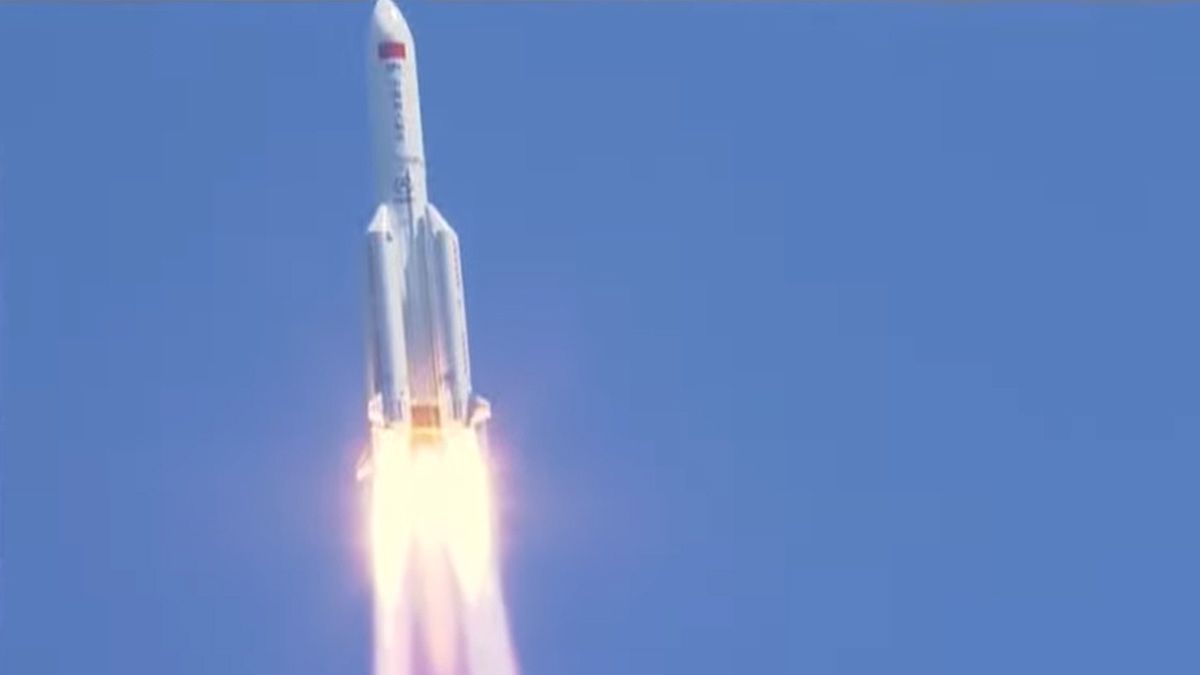
www.space.com
Don't panic about the Chinese space junk crash this weekend
A huge Chinese rocket body is expected to fall to Earth this weekend, but that doesn't mean you should scurry into a bunker.
Science & Tech
A huge Chinese rocket body is expected to fall to Earth this weekend, but that doesn't mean you should scurry into a bunker.
The doomed hunk of space junk is the core stage of the Long March 5B rocket that launched a module to China's Tiangong space station last Sunday (July 24). The latest predictions have the 25-ton (22.5 metric tons) booster coming down on Saturday evening (July 30), though there's a pretty big margin of error in such estimates: plus or minus 16 hours at this point.
Most of the rocket will burn up in Earth's atmosphere, but a significant portion of it — about five to nine metric tons (opens in new tab) (5.5 to 9.9 tons), according to The Aerospace Corporation's Center for Orbital Reentry and Debris Studies — will make it all the way down. The odds of a piece hitting anyone are minuscule, however, given how much of Earth is covered by ocean and sparsely populated land.
There's a "99.5% chance that nothing will happen," Ted Muelhaupt, a consultant with The Aerospace Corporation's Corporate Chief Engineer’s Office, said during a discussion about the coming Long March 5B crash that the company livestreamed today (July 28) on Twitter.
"Personally, if this were coming down on my head, I'd run outside with a camera to watch it, because I think it would be more of a visual [opportunity] than an actual risk," he added.
The surviving chunks of the Long March 5B will be traveling several hundred miles per hour when they hit the ground (or water). Such impacts will be energetic and destructive, but they won't be cataclysmic.
"The worst case in this event is going to be less serious than a single cruise missile strike that we've been seeing every day in the Ukraine war, so let's put it in some perspective here," astrophysicist and satellite tracker Jonathan McDowell, who's based at the Harvard-Smithsonian Center for Astrophysics, said during today's discussion.
All of that being said, the coming Long March 5B crash is a serious and unfortunate event, McDowell and others stressed, particularly because it could have been avoided.
The core stages of most orbital rockets are steered to a safe demise in the ocean or over unpopulated land shortly after liftoff, or, in the case of SpaceX's Falcon 9 and Falcon Heavy vehicles, come down for vertical landings and eventual reuse. The Long March 5B's core stage, however, reaches orbit along with its payload and stays up there until brought down by atmospheric drag.
The big Chinese rocket now has three launches under its belt, so we've already seen two uncontrolled Long March 5B reentries. One of those falls — after the April 2021 mission that lofted Tianhe, the Tiangong space station's core stage — occurred over empty ocean. But the other, in May 2020, scattered some rocket debris over West Africa, some of which apparently hit the ground in Ivory Coast (opens in new tab).
As that incident shows, the potential for injury and infrastructure damage are there in any big uncontrolled space junk fall. And the more such incidents occur, the greater the chance that somebody will get hurt or killed.
"You're not going to win the lottery tonight, but somebody can, and that's why these statistics add up," Muelhaupt said. "We do more of these, we are indeed putting somebody at risk. And it's not required. We have the technology, as the old saying goes, to avoid this. We've learned our lessons. We can control reentry."
China has not fully absorbed these lessons, as evidenced by the Long March 5B's design. But McDowell expressed optimism that the nation will get on board before too much longer.
"I do see China slowly adopting the norms of other countries in space," he said. "And I think it's important to remember that they were sort of a latecomer to space activities. And so they're catching up, and I think they're catching up in norms as well."
























































